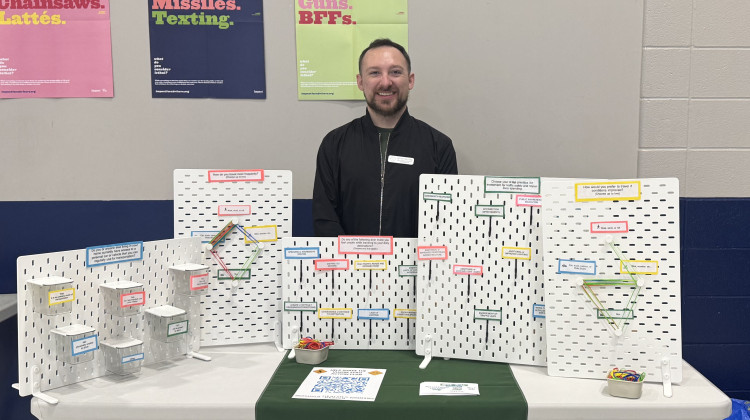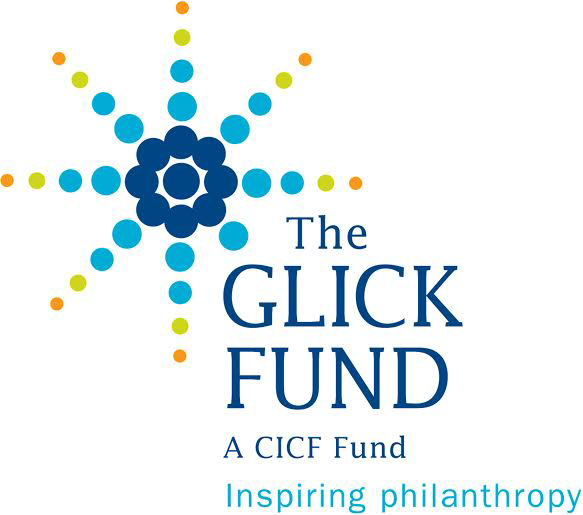
Fourteen-year-old Alex Brown (right) is one of the lead mechanics at the shop. He's one of a dozen kids working there this summer, with ages ranging from 8 to 18. (Drew Daudelin/WFYI)
A bike shop opened last month near downtown Indianapolis. It’s operated out of a garage and run by a dozen kids from the neighborhood. Some see it as a tool to fight the root causes of violence. Some see something deeper – a chance to empower young people by finding and using their untapped talents.
WFYI’s Drew Daudelin spent some time in the garage to find out how it got started. The story starts with De’Amon Harges from the nonprofit in charge of the shop:
|
|
|
De'Amon Harges and others at The Learning Tree spent $500 to buy tools for the shop, weeks after asking the kids if they were interested. (Drew Daudelin/WFYI) |
The shop's first batch of bikes were donated by the Indianapolis Metropolitan Police Department. Police Chief Bryan Roach sees the shop as a way to reduce crime. (Drew Daudelin/WFYI) |
Alex: “He stopped us and he said…he asked us what we knew how to do about bikes. That’s when he said ‘Prove it,’ then we proved it to him.”
De’Amon: “I asked them 'What y’all think about starting a business?' They were like ‘Well, we’ll come back and talk to you.’ Two weeks later they said ‘Hey, were you serious about that bike shop?’”
Narration: De’Amon Harges was serious about the bike shop – it was open one week later. He started it through the nonprofit he works for, The Learning Tree. He says they were confident because the idea came from an interest the kids already had. And some of them, like 14-year-old Alex Brown, are talented mechanics.
Alex: “Yeah, I can do anything on a bike. Basically I was little, and I just kept messing with em, then I figured stuff out.”
Jayden: “When I was 10 I used to fix bikes in the neighborhood, in my backyard, like, put intertubes and tires on, and fix their chains.”
Narration: That’s Jayden Holland, Alex’s 14-year-old friend who works at the shop. Twelve kids work here, ages 8 to 18. They come and go throughout the day, tinker with old bike frames, helping each other out.
De’Amon: “We sell bikes, repair bikes. Tune-ups, tune-ups are 100 bucks, which goes to pay a bike mechanic $35 for a tune-up.”
“We’re not too far from downtown. Harding is part of United Northwest Neighborhood. Harding Street itself is the more lower-income.”
“I heard so many stories about entrepreneurs that I knew it was in the culture of people that lived around here. Just stories about people openin up little shops in their garages.”
Narration: On the day of the shop’s grand opening Chief of Police Bryan Roach shows up. He got the police department to donate over 40 bikes that were destined for the dump.
Bryan: “You probably won’t find this in a paper, that says ‘Hey, how do you reduce violence in Indianapolis? Well you start a bike shop with a bunch of kids.’ But that’s exactly what you do.
Bryan: “They’re looking for something to do, right? And to be engaged in something.”
Jayden: “It’s better for you, than have to bein’ in the streets. You need a job, I think you need a job, when you’re my age. I’ve seen people my age smoke weed, have guns, and they don’t have jobs. We’re starting off in a garage, and we’re making our way up. And we’re showing how to get people off the streets, in a black neighborhood. That’s why I care about it.”
Narration: Like Jayden, some kids told me they’re working at the shop to stay out of trouble. But most of them say they’re there to make money. I asked one of the youngest workers, the 10-year-old Floyd, how much he’s going to make.
Floyd: “4,000”
Drew: “You’re gonna make $4,000?”
Floyd: “Yeah”
Narration: Floyd, unfortunately, won’t make that much. But the kids are making more than they would at a typical summer job. And their pay is based on the hours they work. De’Amon says there’s an important lesson here.
De’Amon: “Money. When I was growing up, because I grew up low-income, people didn’t want to talk to me about money.”
De’Amon: “You know what consignment means? You wanna know what it means? You should. So consignment is when somebody brings a piece of merchandise there and we sell it for them and we take a percentage of it. So we’ll have merchandise and we’ll still have money. So it’s people contributing to our business, really. So that’s how you should explain it. You got your talk ready for tomorrow?”
Jayden: “Yeah”
De’Amon: “Alright”
De’Amon: “The other thing is soft skills. How to approach a person. How to say ‘Yes ma’am, no ma’am.’ ‘Sir, I’d like to tell you what the cost is. I’ll give you a call back and follow through with that.’”
Worker: “What size? If you don’t have your inner tubes it’s 10. If you do have yours it’s uh...five.”
De’Amon: “One of the things that happens in the low-income part of the neighborhood, we forget what gifts and talents are there, so we don’t invest enough money and social ties into that area.”
Narration: While De’Amon and I talk inside the house, Jayden comes in, taking a break from the garage.
De’Amon: “A lot of adults stop by, right?”
Jayden: “Yeah”
De’Amon: “What do they say to you?”
Jayden: “They ask about how we fix our bikes. And how much are the um…like, to get their tires fixes, their inner tubes and stuff, and patch ups. And they ask about how…how can they help us raise money for our bike shop. And they donate stuff sometimes. Like, bikes.”
De’Amon: “How does that feel, Jayden? How does that feel for you?”
Jayden: “That feels like, that feels great to me. For people to actually stop by, and buy bikes, and donate. It feels good.”
De’Amon: “What I like about young people, they dream. You know, they have imagination. That gives you energy. It’s life giving, and not life taking.”
Jayden: “When the bike shop get higher, and we get our own shop, he’s gonna be running it. He’s the CEO.”
Drew: “Is that true?”
Alex: “Yep.”
Drew: “So how big do you want it to get?”
Alex: “Worldwide, yeah. We’re gonna have different shops all around the world.”
Drew: “How are you gonna do that?”
Alex: “Just keep workin’ hard.”
TRANSCRIPT:
De’Amon: “We would sit out on the porch and watch all these kids do tricks on their bikes, there’d be like, just a big mass, like 20, 15 or 20 kids. I stopped them one day and they kind of looked at me strange, like ‘Who is this old man wantin' to...[laughs], wantin' to ask us about bikes?’”
 DONATE
DONATE









 Support WFYI. We can't do it without you.
Support WFYI. We can't do it without you.